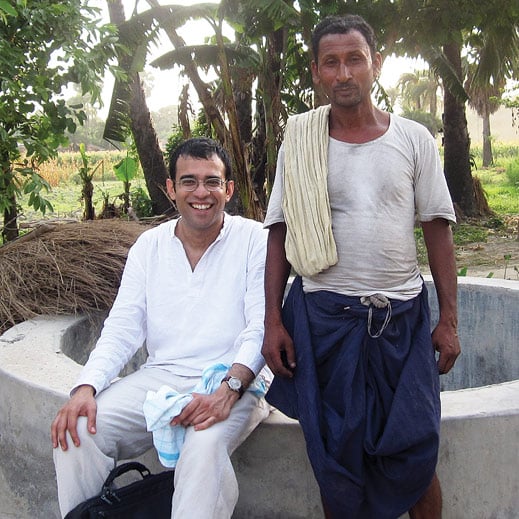Manish Bhardwaj, SM ’01, PhD ’09
When Manish Bhardwaj launched Innovators in Health (IIH) in northeast India’s rural Bihar state, he aimed to help tuberculosis patients—and he did. IIH improved access to life-saving treatments fourfold in less than three years. But the project has also brought new freedom for the women of the remote villages it serves, providing them with training and jobs.

India was a natural place to start the project. Bhardwaj, who was born in New Delhi, went to college in Singapore and then earned a master’s degree in electrical engineering and computer science at MIT. Over the next few years, he applied his studies of energy-efficient sensors at a startup he cofounded to make integrated circuits for wireless networks. While working on his PhD, he met MIT’s Buddhist chaplain, Tenzin Priyadarshi, who described his work combating tuberculosis in Bihar. Bhardwaj agreed to help. “We have had drugs for tuberculosis for 60 years, and the drugs are free in most countries,” Bhardwaj says. “But we still lose two million people a year.” That’s because rural patients can’t get to hospitals regularly.
Bhardwaj had been away from India for decades and had no training in public service, but in 2007 he and Bill Theis ’01, ’02, MNG ’02, PhD ’09, worked on the team that developed uBox, a smart pillbox that helps patients track timed doses of TB medicines. After testing the product in Bihar, they raised money and made local contacts; they launched the IIH field work in 2010. IIH finds people who may have TB, arranges for diagnoses, and provides support for six to eight months of treatment. Funded by donations, the group has already helped save more than 200 patients.
IIH has also trained more than 100 women as community health-care workers. “These are communities where women don’t really work except as day laborers,” Bhardwaj says. “Now we have women in the village who give PowerPoint presentations. We have created a local meritocracy.” Nearly half of IIH’s 28 employees are women, and recently the group began offering a literacy initiative and nursing fellowships for local women.
Today Bhardwaj spends half the year in Bihar and half in Cambridge, where he runs IPX Consulting, advising patent lawyers on technology. He is also a fellow at MIT’s Dalai Lama Center for Ethics and Transformative Values. At home and abroad, his MIT education has served as a “golden crowbar,” he says. “I have used it to break down many doors. I try to wield it for good in the world. We have to strengthen our educational institutions to produce a generation that’s not just technically competent, but trained in ethics and civic virtues.”
Keep Reading
Most Popular
Large language models can do jaw-dropping things. But nobody knows exactly why.
And that's a problem. Figuring it out is one of the biggest scientific puzzles of our time and a crucial step towards controlling more powerful future models.
The problem with plug-in hybrids? Their drivers.
Plug-in hybrids are often sold as a transition to EVs, but new data from Europe shows we’re still underestimating the emissions they produce.
How scientists traced a mysterious covid case back to six toilets
When wastewater surveillance turns into a hunt for a single infected individual, the ethics get tricky.
Google DeepMind’s new generative model makes Super Mario–like games from scratch
Genie learns how to control games by watching hours and hours of video. It could help train next-gen robots too.
Stay connected
Get the latest updates from
MIT Technology Review
Discover special offers, top stories, upcoming events, and more.